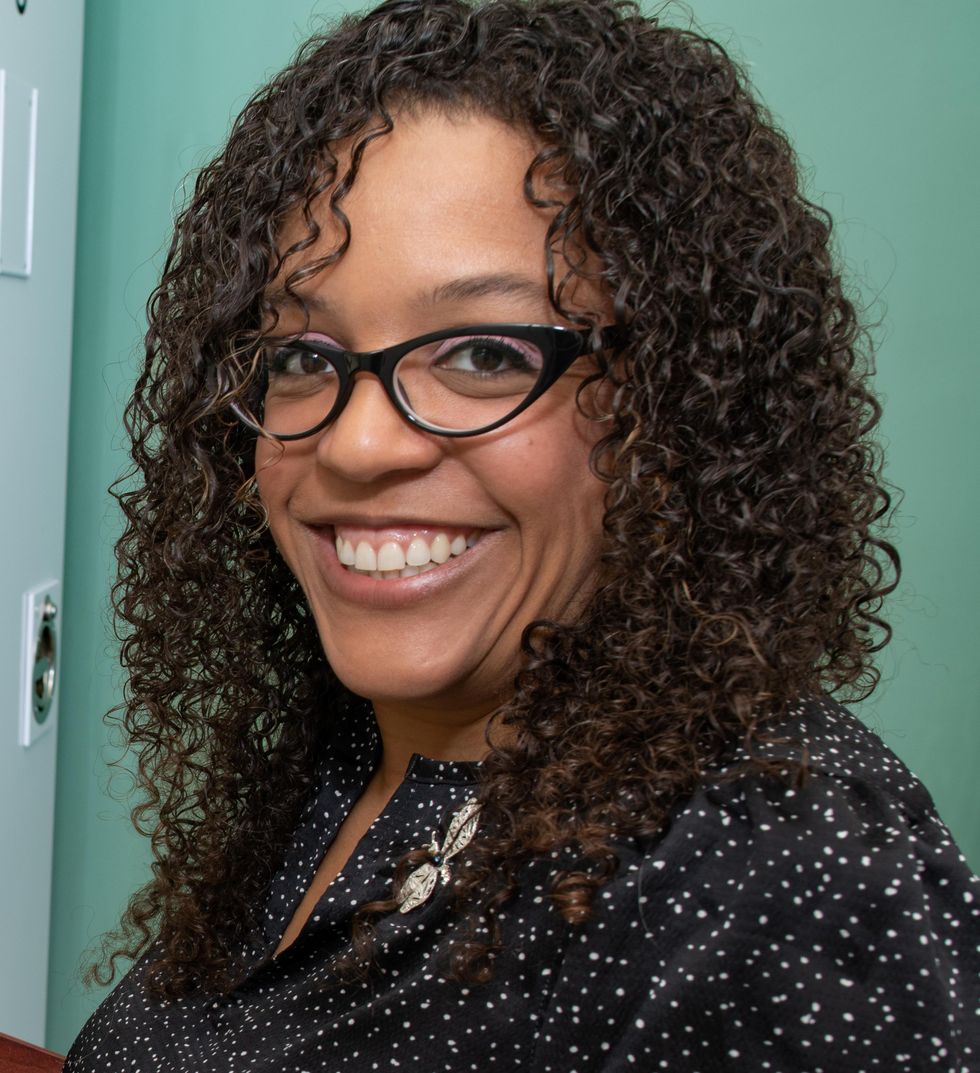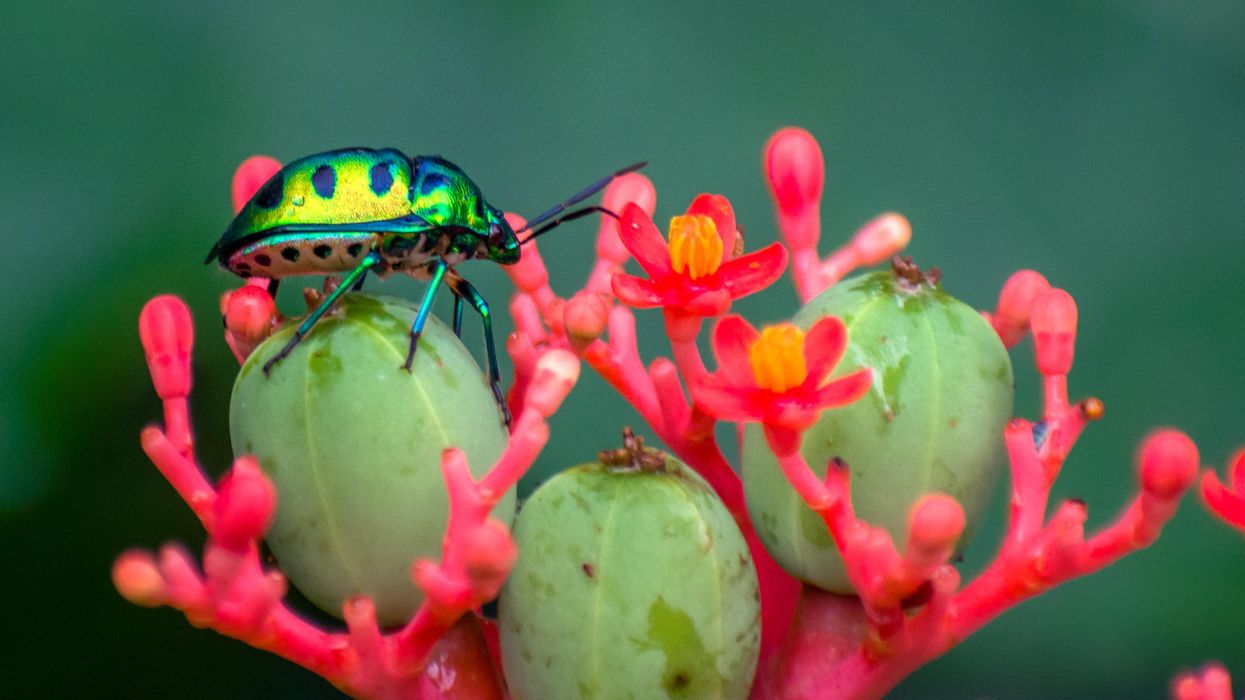Entomologist Jessica Ware is using new technologies to identify insect species in a changing climate. She shares her suggestions for how we can live harmoniously with creeper crawlers everywhere.
Jessica Ware is obsessed with bugs.
My guest today is a leading researcher on insects, the president of the Entomological Society of America and a curator at the American Museum of Natural History. Learn more about her here.
You may not think that insects and human health go hand-in-hand, but as Jessica makes clear, they’re closely related. A lot of people care about their health, and the health of other creatures on the planet, and the health of the planet itself, but researchers like Jessica are studying another thing we should be focusing on even more: how these seemingly separate areas are deeply entwined. (This is the theme of an upcoming event hosted by Leaps.org and the Aspen Institute.)
Listen to the Episode
Listen on Apple | Listen on Spotify | Listen on Stitcher | Listen on Amazon | Listen on Google

Entomologist Jessica Ware
D. Finnin / AMNH
Maybe it feels like a core human instinct to demonize bugs as gross. We seem to try to eradicate them in every way possible, whether that’s with poison, or getting out our blood thirst by stomping them whenever they creep and crawl into sight.
But where did our fear of bugs really come from? Jessica makes a compelling case that a lot of it is cultural, rather than in-born, and we should be following the lead of other cultures that have learned to live with and appreciate bugs.
The truth is that a healthy planet depends on insects. You may feel stung by that news if you hate bugs. Reality bites.
Jessica and I talk about whether learning to live with insects should include eating them and gene editing them so they don’t transmit viruses. She also tells me about her important research into using genomic tools to track bugs in the wild to figure out why and how we’ve lost 50 percent of the insect population since 1970 according to some estimates – bad news because the ecosystems that make up the planet heavily depend on insects. Jessica is leading the way to better understand what’s causing these declines in order to start reversing these trends to save the insects and to save ourselves.
Podcast: Has the First 150-Year-Old Already Been Born
In today's podcast episode, Steven Austad explains why we should want to live a long time as long as that involves longer healthspans.
Steven Austad is a pioneer in the field of aging, with over 200 scientific papers and book chapters on pretty much every aspect of biological aging that you could think of. He’s also a strong believer in the potential for anti-aging therapies, and he puts his money where his mouth is. In 2001, he bet a billion dollars that the first person to reach 150-years-old had already been born. I had a chance to talk with Steven for today’s podcast and asked if he still thinks the bet was a good idea, since the oldest person so far (that we know of), Jeanne Calment, died back in 1997. A few days after our conversation, the oldest person in the world, Kane Tanaka, died at 119.
Steven is the Protective Life Endowed Chair in Health Aging Research, a Distinguished Professor and Chair of the Department of Biology at the University of Alabama Birmingham. He's also Senior Scientific Director of the American Federation for Aging Research, which is managing a groundbreaking longevity research trial that started this year. Steven is also a great science communicator with five books, including one that comes out later this year, Methuselah’s Zoo, and he publishes prolifically in national media outlets.
See the rest of his bio linked below in the show notes.
Listen to the Episode
Listen on Apple | Listen on Spotify | Listen on Stitcher | Listen on Amazon | Listen on Google

Steven Austad is featured in the latest episode of Making Sense of Science. He's a distinguished professor of biology at the University of Alabama Birmingham and has a new book due to be published in August, Methuselah's Zoo.
Photo by Steve Wood
Show notes:
2:36 - Steven explains why a particular opossum convinced him to dedicate his career to studying longevity.
6:48 - Steven's billion dollar bet that someone alive today will make it to 150-years-old.
9:15 - The most likely people to make it to 150 (Hint: not men).
10:38 - I ask Steven about Elon Musk’s comments this month that if people lived a really long time, “we’d be stuck with old ideas and society wouldn’t advance.” Steve isn’t so fond of that take.
13:34 - Why women are winning maybe the most important battle of sexes: staying alive. This is an area that Steven has led research on (see show notes).
18:20 - Why women, on average, actually have more morbidities earlier than men, even though they live longer.
23:10 - How the pandemic could affect sex differences in longevity.
24:55 - How often should people work out and get other physical activity to maximize longevity and health span?
29:09 - Steven gave me the latest update on the TAME trial on metformin, and how he and others longevity experts designed this groundbreaking research on longevity not in their offices, not on a zoom call, but in a castle in the Spanish countryside.
32:10 - Which anti-aging therapies are the most promising at this point for future research.
39:32 - The drug cocktail approach to address multiple hallmarks of aging.
41:00 - How to read health news like a scientist.
45:38 - Should we try a Manhattan project for aging?
48:47 - Can Jeff Bezos and Larry Ellison help us live to 150?
Show links:
Steven Austad's bio
Pre-order Steven's new book, Methuselah's Zoo - https://www.amazon.com/dp/B09M2QGRJR/ref=dp-kindle-redirect?_encoding=UTF8&btkr=1
Steven's journal article on Sex Differences in Lifespan - https://pubmed.ncbi.nlm.nih.gov/27304504/
Elon Musk's comments on super longevity "asphyxiating" society - https://www.cnbc.com/2022/04/11/elon-musk-on-avoid...
Steven's article on how to read news articles about health like a pro - https://www.nextavenue.org/how-to-read-health-news...
AFAR's research on Targeting Aging with Metformin (TAME) - https://www.afar.org/tame-trial
Podcast: The future of brain health with Percy Griffin
Percy Griffin, director of scientific engagement for the Alzheimer’s Association, joins Leaps.org to discuss the present and future of the fight against dementia.
Today's guest is Percy Griffin, director of scientific engagement for the Alzheimer’s Association, a nonprofit that’s focused on speeding up research, finding better ways to detect Alzheimer’s earlier and other approaches for reducing risk. Percy has a doctorate in molecular cell biology from Washington University, he’s led important research on Alzheimer’s, and you can find the link to his full bio in the show notes, below.
Our topic for this conversation is the present and future of the fight against dementia. Billions of dollars have been spent by the National Institutes of Health and biotechs to research new treatments for Alzheimer's and other forms of dementia, but so far there's been little to show for it. Last year, Aduhelm became the first drug to be approved by the FDA for Alzheimer’s in 20 years, but it's received a raft of bad publicity, with red flags about its effectiveness, side effects and cost.
Meanwhile, 6.5 million Americans have Alzheimer's, and this number could increase to 13 million in 2050. Listen to this conversation if you’re concerned about your own brain health, that of family members getting older, or if you’re just concerned about the future of this country with experts predicting the number people over 65 will increase dramatically in the very near future.
Listen to the Episode
Listen on Apple | Listen on Spotify | Listen on Stitcher | Listen on Amazon | Listen on Google
4:40 - We talk about the parts of Percy’s life that led to him to concentrate on working in this important area.
6:20 - He defines Alzheimer's and dementia, and discusses the key elements of communicating science.
10:20 - Percy explains why the Alzheimer’s Association has been supportive of Aduhelm, even as others have been critical.
17:58 - We talk about therapeutics under development, which ones to be excited about, and how they could be tailored to a person's own biology.
24:25 - Percy discusses funding and tradeoffs between investing more money into Alzheimer’s research compared to other intractable diseases like cancer, and new opportunities to accelerate progress, such as ARPA-H, President Biden’s proposed agency to speed up health breakthroughs.
27:24 - We talk about the social determinants of brain health. What are the pros/cons of continuing to spend massive sums of money to develop new drugs like Aduhelm versus refocusing on expanding policies to address social determinants - like better education, nutritious food and safe drinking water - that have enabled some groups more than others to enjoy improved cognition late in life.
34:18 - Percy describes his top lifestyle recommendations for protecting your mind.
37:33 - Is napping bad for the brain?
39:39 - Circadian rhythm and Alzheimer's.
42:34 - What tests can people take to check their brain health today, and which biomarkers are we making progress on?
47:25 - Percy highlights important programs run by the Alzheimer’s Association to support advances.
Show links:
** After this episode was recorded, the Centers for Medicare and Medicaid Services affirmed its decision from last June to limit coverage of Aduhelm. More here.
- Percy Griffin's bio: https://www.alz.org/manh/events/alztalks/upcoming-...
- The Alzheimer's Association's Part the Cloud program: https://alz.org/partthecloud/about-us.asp
- The paradox of dementia rates decreasing: https://www.ncbi.nlm.nih.gov/pmc/articles/PMC7455342/
- The argument for focusing more resources on improving institutions and social processes for brain health: https://www.statnews.com/2021/09/23/the-brain-heal...
- Recent research on napping: https://www.ocregister.com/2022/03/25/alzheimers-s...
- The Alzheimer's Association helpline: https://www.alz.org/help-support/resources/helpline
- ALZConnected, a free online community for people affected by dementia https://www.alzconnected.org/
- TrialMatch for people with dementia and healthy volunteers to find clinical trials for Alzheimer's and other dementia: https://www.alz.org/alzheimers-dementia/research_p...


